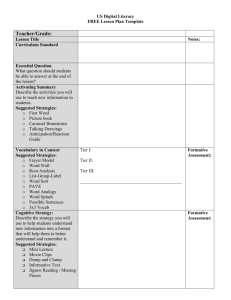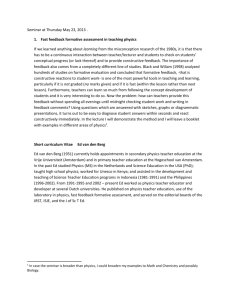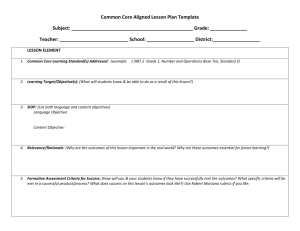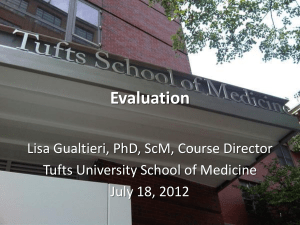development research - Centre for Information Technology in
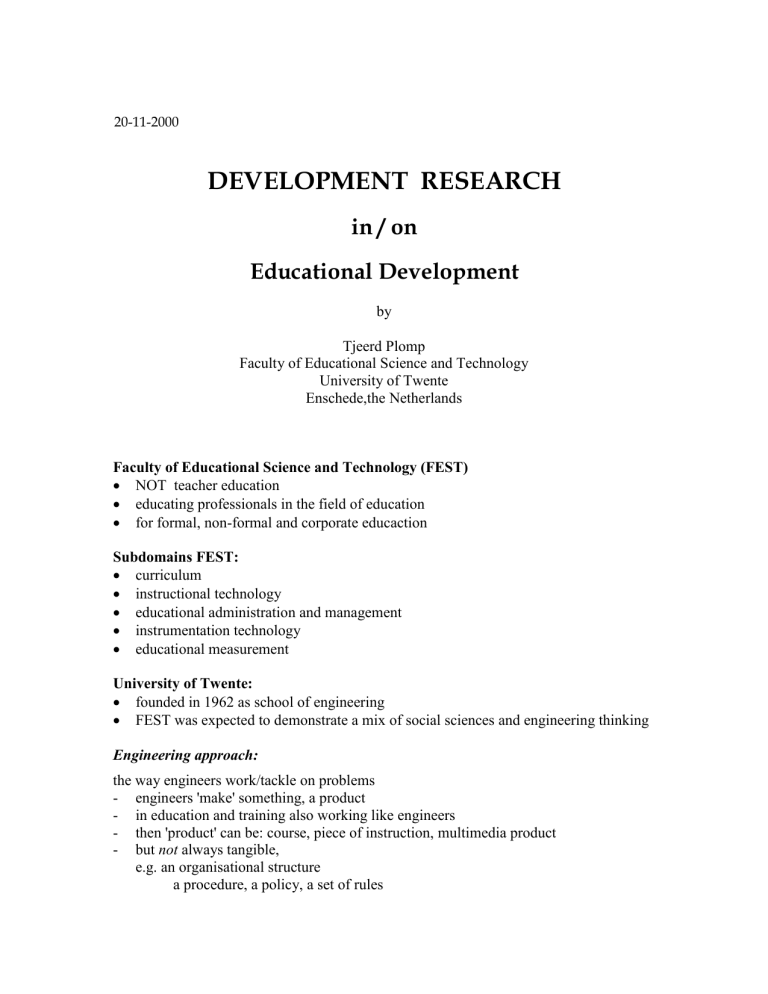
20-11-2000
DEVELOPMENT RESEARCH
in / on
Educational Development
by
Tjeerd Plomp
Faculty of Educational Science and Technology
University of Twente
Enschede,the Netherlands
Faculty of Educational Science and Technology (FEST)
NOT teacher education
educating professionals in the field of education
for formal, non-formal and corporate educaction
Subdomains FEST:
curriculum
instructional technology
educational administration and management
instrumentation technology
educational measurement
University of Twente:
founded in 1962 as school of engineering
FEST was expected to demonstrate a mix of social sciences and engineering thinking
Engineering approach: the way engineers work/tackle on problems
engineers 'make' something, a product
in education and training also working like engineers
then 'product' can be: course, piece of instruction, multimedia product
but not always tangible, e.g. an organisational structure
a procedure, a policy, a set of rules
SO: question is
'how to design and develop a solution that is effective' for that: design methodology equivalents:
educational technology
educational design, development & evaluation
instructional systems design
engineering approach
design & development methodology
…
Design methodology: from different perspectives :
- student: learner/beginning professional, accountable to lecturer, focus on process
- professional: accountable to client, focus on product
- design/developmental researcher:
accountable to (i) scientific forum
(ii) often also: client
In our work as scientists: problems may result => from a need to:
- know
- choose
scientific
activity:
Research
Evaluation
Design/Development - make, develop
Development research: research related to scientific need to ‘make, develop’
7. Generic skills:
Social and communication skills
Information retrieving and processing skills
Academic skills
5. Basic disciplines
Education scs
Psychology
Sociology
Pedagogy
Andragogy
3. Application areas:
Educ. organisation & management
Curriculum technology
Instructional technology
Instrumentation technology
Cognitieve ergonomie
Examination techniques
8. supportive K & S
Mathematics
Physical & technical principles
System theory
4. Research:
Research methodology
Research methods and techniques
2. Design:
Design approaches
Design models
Design methods and techniques
1.
Solving
Education problems
8. supportive K & S
Mathematics
Physical & technical principles
System theory
10. Instrumental skills:
Project management
ICT/computer skills
Working with media
9. Reflection (philosophical, societal)
6. Practical K&S:
(Case studies, field trips, practical tasks, internships)
Figure 4: Building blocks of the curriculum of the Faculty of
Educational Science and Technology as of 1999
(Verhagen, Kuiper & Plomp, 1999)
Problem analysis
Design
Realisation
Implementation
Evaluation
Generic model for educational design
(Fac. Educ. Science & Technology,
University of Twente)
Summary based on Van den Akker (1999)
WHY
1. To increase ‘practical’ relevance of educational research
Because ambitious educational reforms require evolutionary, iterative approaches in view of:
- diversity of problems and needs
- uncertainty about effectiveness of interventions in broad variation of contexts
- crucial importance of implementation
Because ‘traditional’ research offers hardly useful solutions for design problems (too narrow views, too artificial contexts)
2. The complex nature of change and reform processes:
Problems often ill-specified and effectiveness of proposed interventions mostly unknown beforehand
Would profit from more evolutionary approaches (interactive, cyclic, spiral) with integrated research activities to feed the process (both forward and backward)
‘successive approximation’ of the ‘ideals’
WHAT
Definition
Development Research is a problem oriented, interdisciplinary research methodology, aimed at:
Reducing uncertainty of design decisions
Generating concrete recommendations for quality improvement
Testing general design principles
Stimulating professional development
Related terminology
Design studies/research/experiments
Development research studies
Formative studies/research/inquiry
Action research
Engineering research
WHERE
Development Research is employed in domains of:
Curriculum
Instrumentation (ICT, Multimedia)
Learning and Instruction
Teacher Education
Distance Education
FOCUS
Types of Development Research
Formative research: research activities performed during the entire development process of a specific intervention, from exploratory studies through (formative and summative) evaluation studies; aimed at optimization of the quality of the intervention, as well as testing design principles.
(Prototypical studies consisting of design, development, and evaluation of a specific product or program, and analysis of conditions that facilitates the use of this specific product or program.)
Reconstruction studies: research activities conducted sometimes during, but oftentimes after the development process of several interventions; focused on generating and specification of design principles.
Further: focus on Formative research
HOW
Characteristic activities in formative research (that is: how design and development can become a scientific endeavour):
Analysis phase is 'research': thorough and elaborate problem analysis
Theoretical rationale of the design decisions/choices based upon state-of-the-art scientific knowledge ('content validity')
Empirical testing of both the usability and the effectiveness of the intervention through formative and summative evaluation
Systematic documentation, analysis and implementation process and their results reflection of the design, development, evaluation and
Important: formative evaluation as key activity
information richness and efficiency; triangulation
shifting emphasis in quality criteria
RESULTS
Type of knowledge
Mainly heuristic: “If you want to design intervention X [for the purpose/function Y in context Z], then you are best adviced to give that intervention the characteristics
A, B, and C [substantive emphasis], and to do that via procedures K, L, and M
[procedural emphasis], because of arguments P, Q, and R”
Knowledge incorporated within the prototype, but also articulated, and empirical proof of viability
Product quality criteria
Validity:
content validity: reflecting state-of-the-art knowledge
construct validity: all components of the intervention properly linked to each other (internal consistency)
Practicality/usability
Effectiveness
Process quality criteria:
Systematic approach, i.e. cyclic process of analysis, design, development, evaluation and revision, leading to implementation (internal consistency)
Relational approach, leading to agreement among stakeholders (external consistency)
See also under HOW
PROBLEMS AND DILEMMAS
Tension in role division between development and research
- Rule of thumb: shift from in early stage a dominance of ‘creative designer’ perspective, towards in later stages the ‘critical researcher’ perspective
Isolating ‘critical’ variables versus comprehensive and complex design
(‘design experiments’; upscaling)
Generalization of findings
-
No 'statistical' but 'analytical' generalization
-
Ecological validity: theoretical articulation of choices and careful description of process and implementation context
-
Exploration of generalization with experts on related contexts
-
Experimental approach if possible (at end of process)
CHALLENGES
Increasing prominence of prototyping approach:
-
Efficiency of development process?
- creative versus systematic features of design/development process?
closing gap between methodology and practice (can ‘theory’ keep up with
‘practice’?)
ICT trends
- tools and environments for learning and teaching
- tools for designing
- tools for communication
Evaluation methodology
how to increase information richness?
while maintaining efficiency of data collection and analysis
Cross-fertilization between domains and disciplines
